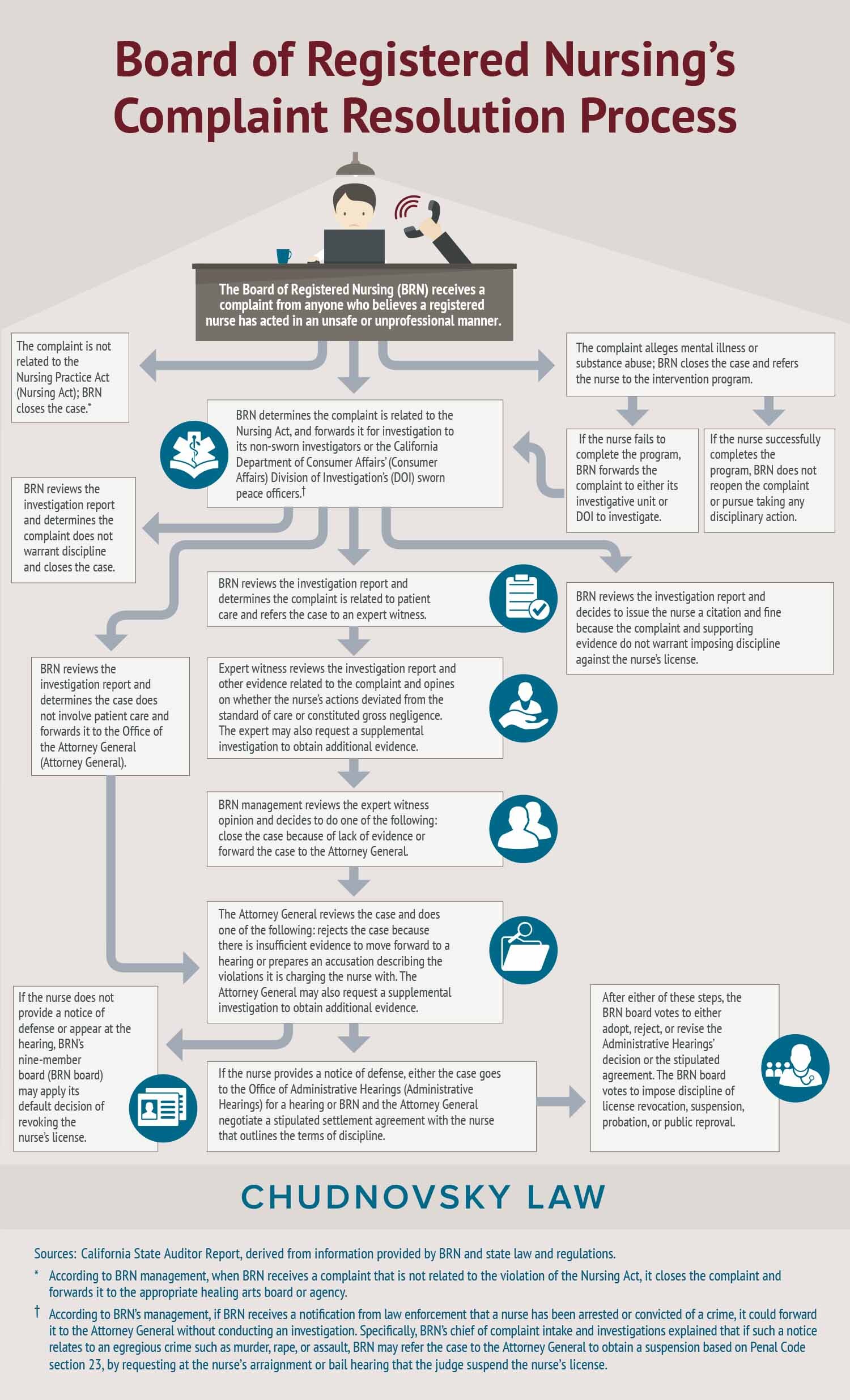California Board of Nursing: Guide to Disciplinary Actions and Complaints
As a nurse, you have dedicated your life to being a healing caregiver in a rewarding but demanding career. Dealing with allegations of misconduct that put your ability to work at risk can be stressful. While anyone can make a mistake, as a nurse, a mistake or even an unjust complaint from an unhappy patient or coworker can trigger a California Board of Nursing investigation and dangerous disciplinary actions.
If you are facing a nurse complaint, investigation or disciplinary action, it is crucial that you understand the process and when to obtain expert legal counsel. Dealing with the California Board of Registered Nursing (BRN) and the California Board of Vocational Nurses and Psychiatric Technicians (BVNPT) involve risks you need to be aware of.
Our California nursing license defense attorney has published this guide to explain complaint and disciplinary actions, the risks, and how to protect yourself.





California Board of Registered Nursing
The California Boards of Nursing consist of two different licensing agencies: the California Board of Registered Nursing (BRN) and the California Board of Vocational Nurses and Psychiatric Technicians (BVNPT). Both boards operate under the California Department of Consumer Affairs (DCA) and have nearly identical disciplinary protocols.
The California Board of Registered Nursing regulates the licensing of RN registered nurses with a mission to protect the health and safety of consumers and promote quality Registered Nursing care in California. California has 524,129 active registered nurses and 36,092 nurse practitioners as of June 30, 2023.
The CA BRN and BVNPT achieve their mandates by:
- Issuing nurse licenses to eligible applicants.
- Investigating nurse complaints, filing formal accusations and disciplining nurses for violations of the Nursing Practice Act (NPA).
- Monitoring nurses whose licenses have been placed on probation.
- Managing a Diversion Program for nurses, whose practice may be impaired due to chemical dependency or mental illness.
The Board of Nursing can suspend licenses for gross negligence, criminal charges, incompetence and violations of the Nursing Practice Act.
CA BRN disciplinary actions substantially increased starting in 2010
The CA BRN prides itself on vigorously protecting consumers. The majority of the BRN’s budget is spent on enforcement. Enforcement activity increased substantially after the California Board of Registered Nursing reorganized and added internal investigators in 2010. The changes were spurred by media scrutiny of reports comparing California’s enforcement statistics with those of the National Council of State Boards of Nursing.
After the expansion of investigative resources in 2010, the BRN began an enforcement blitz vigorously filing accusations against individuals that would not have been filed before. Since 2010, it is now much easier for nurses to lose their license for unfortunate mistakes and one-time aberrant behavior. Practice errors, minor drug, nurse DUI and criminal charges can trigger career ending consequences.
It is now more important than ever that nurses consult experienced legal counsel whenever facing a California Board Nursing investigation or criminal charge.
California Board of Registered Nursing
1747 N. Market Blvd, Suite 150, Sacramento, CA 95834
(916) 322-3350 | (800) 326-2297 TTY for Hearing Impaired
rn.ca.gov
California Board of Vocational Nursing and Psychiatric Technicians
2535 Capital Oaks Drive, Suite 205, Sacramento, CA 95833
(916) 263-7800
bvnpt.ca.gov

California Boards of Nursing disciplinary actions
The BRN implements a wide range of nurse disciplinary actions depending on the circumstances. Per BRN guidelines, the board considers the following 11 factors when determining whether to revoke, suspend or impose probation terms on a licensee for a violation of the Nursing Practice Act or Business and Professions Code:
- Nature and severity of the act(s), offenses, or crime(s) under consideration.
- Actual or potential harm to the public.
- Actual or potential harm to any patient.
- Prior disciplinary record.
- Number and/or variety of current violations.
- Mitigation evidence.
- Rehabilitation evidence.
- In case of a criminal conviction, compliance with conditions of sentence and/or court-ordered probation.
- Overall criminal record.
- Time passed since the act(s) or offense(s) occurred.
- If applicable, evidence of 1203.4 pc expungement proceedings.
Types of nursing disciplinary actions
There are 6 stages to nurse disciplinary actions with many possible outcomes depending on the facts and effectiveness of your legal counsel. The possible resolutions to a Board of Nursing administrative hearing or discipline matter include:
- Revocation or suspension stayed with probation terms
- Revoking or suspending a license
- Interim suspension order
- Voluntary surrender of license
- Judge ordered suspension during a criminal proceeding (PC 23)
- Stipulated settlement or “stipulated agreement”
- Citation and fine
- Public reproval/reprimand (with no license restrictions)
- Closing the matter with no action taken
The board may also seek mandatory cost recovery for reimbursement of its investigative and enforcement costs as authorized in BPC § 125.3. BVNPT disciplinary actions are handled very similarly to BRN disciplinary actions.
California Boards of Nursing complaint review process
Many nurses assume the BRN and BVNPT are on their side. Unfortunately this is not true. The first priority of the California Boards of Nursing are consumer protection, not nurse protection. BRN complaints are taken seriously and carefully reviewed.
The following infographic explains the BRN nurse complaint review and resolution process. The BVNPT nurse complaint process is nearly identical.

California Boards of Nursing complaint priorities
The California Department of Consumer Affairs, Division of Investigation (DOI) prioritizes complaints into the following four priority categories:
Category 1: Urgent, to be referred to DOI
- Acts of serious patient/consumer harm, great bodily injury, or death
- Mental or physical impairment of licensee with potential for public harm
- Practicing while under the influence of drugs/alcohol
- Repeated allegations of drug/alcohol abuse
- Narcotic/prescription drug theft; drug diversion; other unlawful possession
- Sexual misconduct with a patient
- Physical/mental abuse of a patient
- Over-prescribing
- Gross negligence/incompetence resulting in serious harm/injury
- Media/politically sensitive cases
Category 2: High, to be referred to DOI
- Prescribing/dispensing without authority
- Unlicensed practice/unlicensed activity
- Aiding and abetting unlicensed activity
- Criminal violations including but not limited to prescription forgery, selling or using fraudulent documents and/or transcripts, possession of narcotics, major financial fraud, financial elder abuse, insurance fraud, etc.
- Exam subversion where exam is compromised
- Mandatory peer review reporting (BP §805)
- Law enforcement standby/security (subject to staff availability)
Category 3: Routine, to be referred to nursing board
- General unprofessional conduct and/or general negligence/incompetence resulting in no injury or minor harm/injury (non-intentional act, non-life threatening)
- Subsequent arrest notifications (no immediate public threat)
- Exam subversion (individual cheating where exam is not compromised)
- Medical malpractice reporting (BP §801) cases unless viewed as category 1 or 2
- Serving subpoenas for hearings and for records (non DOI investigations)
- Patient abandonment
- False/misleading advertising (not related to unlicensed or criminal activity)
- Applicant misconduct
Category 4: Routine, to be referred to nursing board
- Unsanitary conditions
- Project abandonment
- Failure to release medical records
- Record keeping violations
- Continuing education violations
- Declaration and record collection (e.g., licensee statements, medical records, arrest and conviction records, employment records)
- Complaints of offensive behavior or language (e.g., poor bedside manner, rude, abrupt, etc.)
- Quality-of-service complaints
- Complaints against licensee on probation that do not meet category 1 or 2
- Anonymous complaints unless Board can corroborate it meets category 1 or 2
- Non-jurisdictional issues
Resources:
“I have been an RN for 16 years with a perfect record at my hospital. I found myself needing a nursing lawyer for the first time in my life after getting a DUI in Los Angeles. This was the most humbling and distressing experience I’ve ever experienced.
Attorneys Suzanne Crouts and Nicole Enyart represented me with both the DUI case and BRN investigation that followed. They were very knowledgable, attentive and kind. I was given their cell phone numbers and they were always very responsive and supportive.
In a nutshell, I learned a lot of patience is needed when going through this process. I allowed them to take care of everything for me. It was clear they are experts in DUI defense and nursing regulations. Suzanne and Nicole did exactly what they promised and I could not have asked for better representation. They were worth every penny I spent to have such a down to earth and competent legal team fighting for my career and reputation.”
BROOKES

Experienced Board of Nursing lawyers
When your reputation and career are on the line, there is no substitute for knowledge of the system and tactics you are facing. Chudnovsky Law attorneys Gillian Friedman, Brian Bill, Robert Weinberg, Suzanne Crouts, and Melissa DuChene have a combined 100+ years experience representing nurses in California Board of Nursing license defense and criminal defense matters. They have handled over 8,000 cases, administrative hearings, and court trials.
We invite you to read client testimonials and agency ratings to learn more about how we have helped other nurses facing Board of Nursing disciplinary actions. Our attorneys have the qualifications and experience to skillfully fight your case and investigators while protecting your rights and nursing license.
To learn more and review your case, call us at (844) 325-1444.
Licensing Consultation and Analysis
If you would like to book a 1 hour legal analysis and advice session on your license case, please visit the page below.
Disclaimer
This information does not constitute legal advice and is not a substitute for individual case consultation and research. No representations are made as to the accuracy of this information and appropriate legal counsel should be consulted before taking any actions. Contact us for a consultation regarding your case to learn more.
Written by Melissa DuChene and Gillian Friedman.
